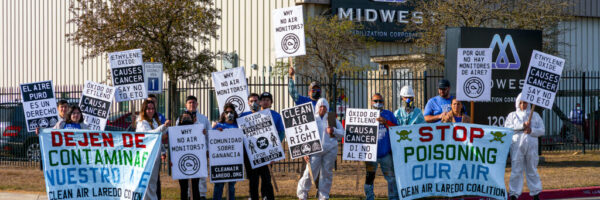
The ravages of cancer and a new fight for prevention
A growing understanding that exposure to certain chemicals in the environment may be a huge contributor to rising cancer rates has led to a new coalition of scientists and advocates working to alert the public and push regulators to protect people from carcinogens.

Amid efforts to cool the planet, solar geoengineering draws heated debate
By Shannon Kelleher
Luke Iseman got tired of waiting for the world to stop climate change so he decided to try it himself. The founder of a controversial two-person startup called Make Sunsets has begun launching balloons filled with sulfur dioxide high into the sky with the intention of imitating the effects of volcanic eruptions.

More evidence of plastics harm to Florida manatees
By Ed Rodgers
The manatees found along Florida’s Gulf Coast already face numerous threats to their survival: Boat strikes, red tide, harmful algal blooms, and a loss of the sea grass beds that provide their main food source have taken a toll on the gentle herbivores.

EPA proposes limits on cancer-causing gas used to sterilize medical equipment
By Shannon Kelleher and Grace van Deelen
The US Environmental Protection Agency (EPA) on Tuesday proposed new standards to protect workers and communities from exposure to ethylene oxide, a toxic gas used to sterilize medical equipment and some spices. The agency estimates the new health protections could cut commercial facilities’ emissions of the colorless cancer-causing gas by 80% per year.

Banned carcinogen found in 88% of household objects, says new study
By Grace van Deelen
A banned chemical that potentially causes cancer in humans has been discovered in a wide array of household products, according to a study out today.

New book details behind-the-scenes drama of Roundup trials
It’s been nearly eight years since the filing of the first US lawsuit alleging that Roundup weed killer and other herbicides made by Monsanto with a chemical called glyphosate can cause non-Hodgkin lymphoma (NHL). Fueled by findings from international cancer scientists, the allegations sprawled into nationwide litigation that ultimately included more than 100,000 plaintiffs, and unveiled long-hidden corporate secrets.

As trade dispute heats up, Mexico further slashes glyphosate imports
By Carey Gillam
Amid a high-stakes stand-off with US trade officials over favored American agricultural products, Mexico is slashing the amount of glyphosate allowed to be imported into the country by 50% for 2023.

Harmful emissions from Gulf oil and gas production far higher than EPA reports, study finds
By Shannon Kelleher
Offshore oil and gas operations in the Gulf of Mexico are releasing far higher quantities of a potent greenhouse gas than regulators have estimated, according to a new study published Monday.

Letter to the EPA: Take action on “Devil’s bargain” pesticides
An Open Letter to: Michael Regan, Administrator; Michal Freedhoff, Assistant Administrator, Office of Chemical Safety and Pollution Prevention; and Ed Messina, Office of Pesticide Programs Director, Environmental Protection Agency.

As US pushes “climate-smart” agriculture, hopes and fears collide
By Keith Schneider
For decades, leading US farm leaders have likened efforts to rein in harmful climate change as attacks on agriculture itself, aligning with oil and gas industry groups to block policies aimed at reducing greenhouse gas emissions.